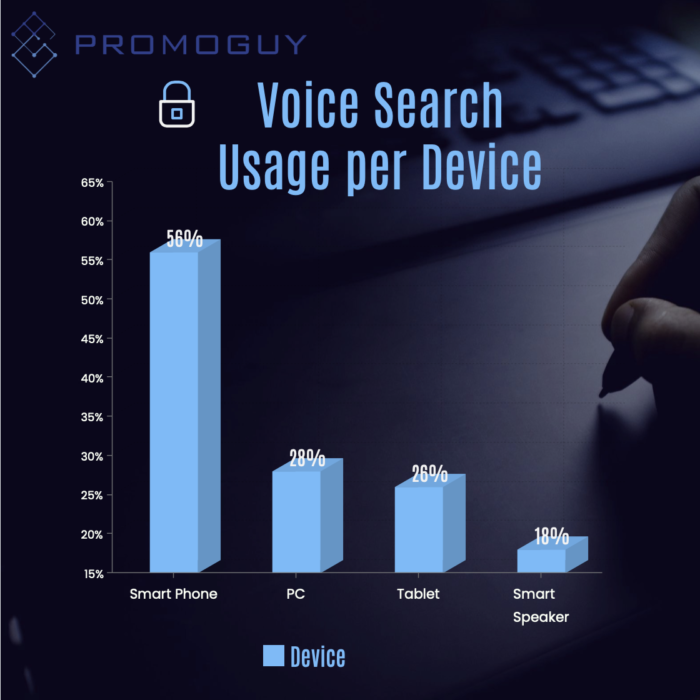While the Internet has largely been a visual medium, audio tools might be gaining ground soon. Studies show that companies are investing more resources into voice search technologies and software. Similarly, audio applications are allowing for some unique new types of data collection and analysis.
This article will examine some of the major trends and why businesses should take note. These also have grave implications for how voice search may factor into a company’s future SEO needs.
Voice Search SEO & Optimization Grows
As voice search and technologies like it grow, voice and sound data will become a new avenue for search engines and social media platforms. The ability to use Google through assistants like Alexa and Siri has caused growth in voice search technologies, particularly as hands-free devices while driving. As with all things in digital marketing, this has opened up new forms of SEO and data gathering.
Companies are even setting up voice search optimization services to aid firms in charting this new trend. Apparently, 27% of Google users use voice search for their search engine needs. Additionally, 75% of voice searches rank in the top three positions for a particular question. What this means is that voice search is a competitive field aiming for a quarter of all people using Google.

Here are some easy ways to optimize for Voice Search:
- Focus on featured snippets since Google focuses on them.
- Focus on knowledge graphs as well.
- Question keywords and Longtail keyphrases are more representative of voice search queries.
- Schema mark-ups also aid voice searches in rising to the top.
- Optimize for mobile, since a lot of voice searches come from mobile devices.
Voice Search as a Local SEO Tool
Voice queries are beneficial for local search optimization, especially for businesses. A few ways to help boost your local search for voice queries include:
- Keep your Google My Business and Yelp listings up to date.
- Make sure you are on Google and Apple Maps.
- Optimize for different voice assistants (they can have minute differences). More info is below.
- Pay attention to different types of Voice Search: Discovery, Direct, and Knowledge.
| Discovery | Direct | Knowledge |
|---|---|---|
| “What are the best bakeries near me?” “Find a mechanic in Brooklyn” |
“Call Alex, Aneliya, and Associates” “Reserve a table at Roasters” |
“How many days left until the NBA playoffs?” “What was the name of the singer of Queen?” |
Voice Search Optimization for Different Assistants
The data shows that 62% of consumers want a single integrated voice assistant for all their devices. Sadly, this is less likely to happen as all the major companies have their hands in different voice technologies. Apple has Siri, Amazon has Alexa, and so on.
This also means that you need to optimize for different assistants. For voice search, registrations for different related applications can be necessary. So here’s a rundown of where differences can arise between these voice assistants.
Siri captures 36% market share for voice search. Since Apple owns Siri, Apple affiliate software like Apple Maps connects to it. Similarly, Apple Maps has no review function but rather obtains reviews from Yelp. Optimize for these two and it helps your Siri searches.
Google Assistant also has 36% of the market share. Optimization works in a similar way: optimize on Google Maps and Google My Business and you’ll be good. Alexa has 70% market share for speakers, so it’s a crucial market. For Alexa, you need to optimize Yelp, Yext, and Alexa’s own local search.
Chat Assistants & Voice Chat Bots
On the other side of the coin, you can always have your own chatbots and chat assistants. Such digital assistants can run your customers through the common problems that they might face. Work chat-bots and conversational AIs can be handy as they save a lot of manpower.
So, how can these help in SEO? Companies can repurpose the most popular queries from their chatbots and turn them into FAQ pages. This can save a lot of time for less chat-savvy customers and can cover the important ground for a lot of search queries. If customers are asking a chatbot, they are most certainly asking Google as well.
AI Voice Recognition

AI voice recognition is getting more and more powerful as time goes on. One of the areas this has been prominent is voice recognition biometrics for security. However, this may also help AI cater to customer needs more efficiently.
Imagine instead of using separate Netflix accounts or computer profiles, voice biometrics can rapidly inform a computer who you are and have it pull up your recommended user experience and preferred content without being told. This could lead to better cataloguing of customer preferences and could streamline applications that are dependent on multiple users.
For home assistant conversations, multiple people could use one device without mixing their data or Google searches.
Text to Speech Content
When it comes to content, speech and audio data can be useful in a number of ways. Different programs use text-to-speech technologies so you don’t have to deliver voice-over. Advanced software also includes features like celebrity text-to-speech options which can provide interesting content options.
People have been making videos using celebrity voices for a while now. This all relies on voice data and can be a handy way of quickly making readable content or funny ads. Of course, this runs up to a number of possible legal issues but is an interesting prospect for content creators nonetheless.
Voice Search Data Analyses
All of these various audio technologies open up a goldmine for marketing analytics. Alexa’s voice search, for example, feeds a lot of data for Amazon’s needs. Voice search data will become the goldmine that regular search data already is. However, it may be even more valuable in a number of ways.
Think about it: voice searches contain inflexions and automatic assessments of gender, voice type, or accents. Even the words one uses to refer to products or search queries can provide marketers with insights into how to relate to customers. These can provide a treasure trove of digital information to whoever needs it.
In the future, voice pattern analysis may become so strong that it can judge inflexions and contexts. Voice recognition data analysis may even be able to predict personality traits and provide stronger recommendations eventually.
This field of study can also lead to more and more intuitive voice search analysis technologies that can rifle through troves of user data and contextualize it all. Who knows what the future may hold?


